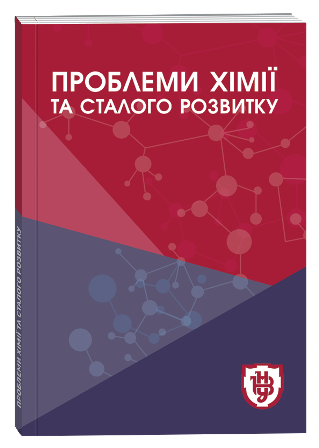FORMATION OF EXPERIMENTAL COMPETENCE OF FUTURE CHEMISTS IN THE PROCESS OF PROFESSIONAL TRAINING IN AN INSTITUTION OF HIGHER EDUCATION
DOI:
https://doi.org/10.32782/pcsd-2022-3-1Keywords:
experimental competence, components, maturity levels, criteria, indicators, professional training of chemists, chemical experimentAbstract
The article deals with the issue of Chemistry students’ experimental competence formation in professional training at higher educational institutions. Higher Educational Standards and educational training programs are analyzed in order to establish the experiment importance in chemists’ professional training. The definition of experimental notion of future chemists is formulated based on the synthesis of existing interpretations. Taking into consideration the significant role of the experiment in the professional chemist’s activity and the analysis of literary sources, the system of knowledge, abilities, skills and motives necessary for chemists to perform their professional duties is characterized. To conduct a pedagogical experiment to determine the effectiveness of the formation of experimental competence of future chemists, its theoretical principles and program are developed. In the empirical study, the levels of the experimental competence of future chemists (low, medium, sufficient, high) on the basis of selected components (motivational, cognitive, operational, activity) in accordance with selected criteria and corresponding indicators were determined. To conduct a pedagogical experiment to determine the effectiveness of the formation of experimental competence of future chemists, its theoretical principles and program are developed. According to the initial assessment of the respondents’ competence it has been found that most of them have an average level of its maturity. In order to improve it, there has been conducted an experiment, which involved introducing the following stages of future chemists’ experimental competence formation in the process of training: focus on mastering the experimental competence; acquisition of theoretical chemical knowledge; mastering practical skills; gaining professional experience of the experimental competence application. The effectiveness of forming the experimental competence of future chemists according to the identified components has been proved by statistically significant positive changes. The reliability of the obtained results has been proved by means of Student’s t-test.
References
Karslі F., Yaman F., Ayas А. Prospective chemistry teachers’ competency of evaluation of chemical experiments in terms of science process skills. Procedia – Social and Behavioral Sciences. 2010. Vol. 2. Issue 2. P. 778-781. doi: org/10.1016/j.sbspro.2010.03.101
Tolsdorf Y., Markic S. Exploring Chemistry Student Teachers’ Diagnostic Competence – A Qualitative Cross-Level Study. Education Sciences – Open Access Journal. 2017. Vol.7. Issue 86. doi:10.3390/educsci7040086
Short E. C. Competence: Inquiries into its Meaning and Acquisition in Educational Set-tings. Lanham etc. : University Press of America, 1984. Vol. VI. 185 p.
Schröder H. Theorie und Praxis der Erziehung /Herausgegeben von Wilhelm H. Peterssen. München, 1999. 256 р.
Головань М.С. Зміст та структура професійної компетентності декана факультету вищого навчального закладу III-IV рівня акредитації. Гуманітарний вісник ДВНЗ «Переяслав-Хмельницького державного педагогічного університету імені Григорія Сковороди», 2013. Вип. 31, Т. ІІІ (45). С. 66-74.
Ігнатюк О.А. Формування готовності майбутнього інженера до професійного самовдосконалення : теорія і практика. Харків, 2009. 432 с.
Ковтонюк М.М. Теоретичні і методичні засади фундаменталізації загальнопрофесійної підготовки майбутнього учителя математики : дис. д-ра пед. наук : 13.00.04. Вінниця, 2014. 400 с.
Марцева Л.А. Теоретичні та методичні основи професійної підготовки молодших спеціалістів радіотехнічного профілю: дис.д-ра пед. наук : 13.00.04. Львів, 2015. 459 с.
Walliman N. Research methods the basics. London-New York: Routledge, Taylor & Francis Group, 2011. 190 p.
Hesse-Biber S. The problems and prospects in the teaching of mixed methods research. International Journal of Social Research Methodology. 2015. Vol. 18. Issue 5. P. 463–477. doi: 10.1080/13645579.2015.1062622
Horakova T., Houska M. On Improving the Experiment Methodology in Pedagogical Research. International Education Studies. 2014. Vol. 7. Issue 9. Р. 84–98. doi: 10.5539/ies.v7n9p84
Професійна етика вчителя : час і вимоги / за ред. Б.М. Жебровського, Л. М. Ващенко. Київ : Ірпінь, 2000. 257 с.
Волкова Н.П. Педагогіка: посібник для студентів вищих навчальних закладів. Київ : Видавничий центр «Академія», 2002. 576с.
Галатюк М.Ю. Формування експериментальної компоненти у контексті розвитку навчально-пізнавальної компетентності старшокласників. Збірник наукових праць Кам’янець-Подільського національного університету імені Івана Огієнка. Серія педагогічна, 2010. Вип. 16. С. 143-145.
Заболотний В.Ф., Демкова В.О. Експериментальна компетентність як складова професійної підготовки студентів. Вісник Чернігівського національного педагогічного університету. Серія: Педагогічні науки, 2015. Вип. 127. С. 49-52.







